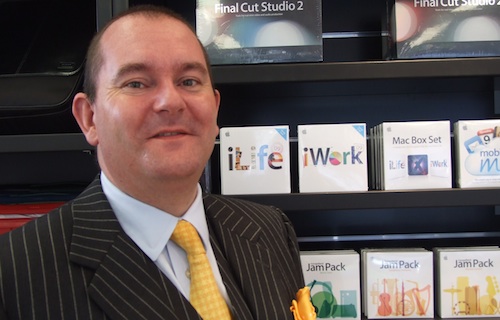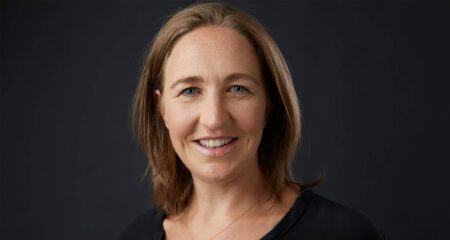
Rutger-Jan van Spaandonk says if his parents had known he’d eventually make a home for himself outside of The Netherlands, his country of birth, they’d have given him a name that’s easier for foreigners to pronounce.
The executive director of Core Group, who is known by most people simply as “RJ”, emigrated to SA almost by chance in the late 1990s. He says he’s since fallen in love with the country and, though he still travels extensively to Europe and West Africa on business, he says he has no intention of living anywhere else.
Van Spaandonk is a colourful character in SA’s technology industry. In the little more than a decade he’s been in the country, he has courted more than his fair share of controversy, particularly in his role at Core Group, the exclusive distributor of Apple products in SA, where he has been since 2001.
When we meet outside Core’s new head office building in Sandton, north of Johannesburg, Van Spaandonk, wearing his trademark braces and carrying a copy of the Financial Times, makes it clear he is keen to get down to business.
As we wait for our coffee in the company’s well-kept and peaceful gardens, overlooking the wealth of the Sandton central business district, he begins to recount the path that led him from The Netherlands — via the US and London — to the southern tip of Africa.
The son of construction firm executive and a high school teacher (both now retired), Van Spaandonk grew up in a small village called Berkel-Enschot. After school, at the age of 18, he was enrolled at Nijenrode, a private university built around a storied 13th century castle, where he completed a three-year bachelor of business administration degree.
He spent four years as a consultant in the property and infrastructure industries before securing a bursary from McKinsey & Co and heading to the US in 1995, at the age of 25, to do an MBA at the prestigious Wharton School at the University of Pennsylvania.
Why the US, I ask? “It’s very expensive,” he concedes, “but most international companies, especially in consulting and financial services, will repay your investment very quicky.”
Van Spaandonk adds with some hubris: “There are people who have an MBA and there are people who have an MBA. It’s something people in SA don’t want to hear but it’s very different studying at a local school and studying at one of the world’s top universities. If you want to do an MBA, go to one of the well-established institutions, otherwise you’re wasting your time and money.”
After completing his MBA, Van Spaandonk joined US consulting firm Mitchell Madison Group, a McKinsey spin-off, based in London. But the grey weather quickly got to him. So, in February 1998, when he came to SA on Mitchell business — the company was establishing an office here — he decided to stay. “I found such a great, positive vibe,” he says. “Everyone in SA had this attitude that they could make something of the country.”
Still with Mitchell Madison Group, Van Spaandonk helped Transnet and Standard Bank drive some of their e-business initiatives at the time.
However, Mitchell, which by then had morphed into MarchFIRST after various corporate mergers and deals, went bust.
“My pension fund, everything, was tied up in the dot-bomb bullshit,” Van Spaandonk says. “I know what it means to lose a lot of money.”
After the MarchFIRST collapse, Van Spaandonk struck out on his own, forming a small, Johannesburg-based consultancy called Future Foresight with several ex-McKinsey colleagues.
But it wasn’t long before he met Core Group CEO Rodney Ichikowitz. At that stage — it was 2001 — Core was a relatively small distributor of IT solutions for the media industry. Today, it has revenues of “well in excess of R1bn/year” and is the sole distributor in SA for the Apple and Nintendo brands.
Ichikowitz brought Van Spaandonk on board to help run the company as head of strategy and business development, and to be its public face.
It is in the latter role that Van Spaandonk has racked up a number of detractors, people who accuse him of being arrogant and defending a company whose prices, they say, are excessive.
Perhaps Core’s biggest strength — the fact that it has sole distribution rights in SA to the Apple and Nintendo brands — is also one of its biggest PR weaknesses. Because no-one else is allowed to import these companies’ products through official channels, some consumers have accused Core of monopoly pricing and behaving like a bully.
It’s a charge that makes Van Spaandonk see red. “I’ve informed every serious representative in the media in SA that the iPod attracts 25% import duty over regular ad valorem taxes. If people write blog entries accusing you of all kinds of things, you don’t respond to that.”
Except, Van Spaandonk did respond — in a series of sarcastic and ill-considered messages on Twitter, the micro-blogging service, in which he took on his detractors. He admits the way he handled it was a mistake, and that it backfired. “The interesting thing is, though, that the discussion died down for a while once I’d put the facts out there.”
The question remains, though, why consumers — even if a small minority — get so het up over Core Group and its prices. I ask Van Spaandonk what he thinks the reason is. He says some of the blame must go to people who want to get their hands on the Apple distributorship. He says there are people in the market spreading anti-Core Group propaganda.
“I have a number of colleagues in the industry who would love to get their hands on the Apple distribution business and they bring [the pricing issue] to the attention of Apple all the time,” he says. “All this is aimed at other people positioning themselves to take over the Apple distributorship.”
Van Spaandonk defends the fact that there is only one Apple distributor in SA, saying in an environment where there are multiple distributors, resellers simply play them off against each other for the lowest price. As a result, the distributors have no money to invest in marketing the brand and creating demand.
This was the case when the now-defunct Siltek Distribution Dynamics was also an Apple distributor, he says.
Van Spaandonk says he has little time for bloggers who criticise Core Group and its prices without doing adequate research into prices in similar markets around the world. He seems to be trying his best not to let them get to him, but it’s clear he takes the attacks personally.
When I ask him what he does for fun, he tells me about his love for writing, and the articles he writes for Business Day’s Wanted supplement and for GQ magazine. But he quickly uses this to take a pot shot at Core Group’s critics. “I tend to write a lot, but not on blogs,” he says. “Please put this in your story: unlike bloggers, I actually get paid to express my opinion.”
It takes a little effort to steer the conversation back to his private life, but eventually Van Spaandonk eases back and begins talking about his love for the finer things in life: Cuban cigars, luxury cars, and good food and wine.
“I take food and wine very seriously,” he says. “I can wax lyrical about a bottle of wine for hours.”
And a meal in a restaurant is never to be rushed. “Taking someone out for a meal is the start of a relationship. Sharing food with someone is one of the most basic and meaningful things you can do,” he says. “That’s why when I meet people for the first time, I do it over lunch. And you’d better cancel your appointments for the rest of the afternoon.”
He says his favourite restaurants include La Colombe at Constantia Uitsig near Cape Town, Reuben’s in Franschoek and Auberge Michel in Johannesburg. But if he had to choose just one, he says he’d have to go with the Cleopatra Mountain Farmhouse in the Camberg area in KwaZulu-Natal, run by his good friend Richard Poyton. “You go there, you check in, and they just feed you.”
One of Van Spaandonk’s other great passions is reading. He gets through a book a week — fiction and nonfiction. And he doesn’t only read in English and Dutch. He is fluent in German and French, too. “It’s important to delve into ideas in depth,” he says of his passion for reading. “The Internet and television are not enough.”
He also enjoys travelling and says he is “not afraid” to explore Africa. He spends considerable time in Nigeria on business.
Van Spaandonk, now 39, is not married but is in a long-term relationship of more than 17 years. He has no children and professes to have no interest in having any. “I’m too busy enjoying life,” he says. “You need the freedom if you want to travel a lot. Kids are a drain on your energy and on your time.” — Duncan McLeod, TechCentral




